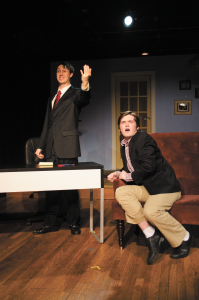
Although the bond of a family is meant to be everlasting, loved ones can be suddenly lost without a goodbye or a conversation to remember as the last. Nothing will inspire an urgent need to call home quite like the Mask and Bauble Dramatic Society’s latest production, “Beyond,” by Conor Ross (COL ’16).
Directed by Marnie Klein (NHS ’17) and produced by Emily Grau (COL ’16), “Beyond” is a feature of the 30th Annual Donn B. Murphy One-Acts Festival. Inspired by the legendary influence of a former Georgetown professor, the festival celebrates the long-standing tradition of Mask and Bauble.
There is no better way to commemorate such an occasion than with “Beyond,” Ross’s intense work of art that represents the epitome of impactful theater. It confronts the tragedy of loss and exposes the importance of honoring familial relationships, undoubtedly striking a very sensitive chord that will resonate with many.
In “Beyond,” Alan and Erin, played by Charlie Trepany (COL ’19) and Emma Zetterberg (COL ’19), suffer the tragic loss of their father, Robert, played by Ari Shapiro (SFS ’18). Along with Robert’s wife Adelaide, played by Cristina M. Ibarra (COL ’17), and the mortician Craig, played by Alexander Yurcaba (COL ’18), the two siblings begin to reassess their priorities when faced with this sudden family crisis.
The production immediately begins with a passionate monologue, spotlight shining on a lone stool set in the middle of the stage.
“Anyone who wishes to speak may come forward now,” Adelaide states while suppressing tears.
She directs her eyes, visibly filled with grief, to the space directly in front of her. She smiles sadly and pauses, making the premise clear. This is a funeral and the audience members are the mourners.
Following this initial scene, the lights brighten to reveal two simply designed living spaces. The distinguishing elements, however, are the picture frames. On the wall above the couch hangs a collection of vivid photographs, some depicting a family and others presenting individual profiles. On the other side of the stage, more frames descend from the ceiling with similar subjects.
The simplicity of the set emphasizes the intricate details of the photos, suggesting a central theme: memory. At one point, overwhelmed by the lingering memory of his father, Alan hurls a book at the frames. They crash to the ground and send splinters of wood flying across the stage. This striking moment signals that the recollection of a lost past can be brutally haunting.
Although “Beyond” forces a difficult look into the ultimate meaning of loss for a family, there are also sweet moments that restore hope in love. In one instance, as Erin and Alan wait at the bus stop, Erin offers her brother a cigarette. He accepts and holds it to the lighter but soon throws it to the ground after violently choking on the smoke. The two siblings erupt into hearty peals of laughter, which eventually settle into a beautifully executed moment of tenderness.
In an equally heartwarming moment, the family finally sits down for dinner together. They find themselves sharing stories from their childhoods, reminiscing over beloved lost memories. The somber ambiance that seemed so permeating throughout the show is abruptly broken by these jovial eruptions of teases and giggles. It is not long, however, before the merriment is interrupted and the atmosphere of grief returns. This fluctuation of emotions opens a portal into the experience of a real family dealing with a real tragedy. In here lies the greatest merit of “Beyond” — it is all just extraordinarily truthful.
The variety of relationships in “Beyond” incorporates many complexities of family life: mother to daughter, father to son, brother to sister and even lover to lover. The essence of these relationships is established instantly, pointing to the talent of the actors, director and writer alike. They effectively provide the show with a powerful emotional charge.
According to Klein, the atmosphere in rehearsals allowed this in-depth characterization.
“We are an experimental show,” Klein said. “We start off with something much more malleable than a typical show would and then we take the script and get to move it around.”
The cast and crew dedicated much time and effort to working closely with each other and with Ross himself to develop layers of personality and plot.
“We had actors on laptops working with me on what tweaks we could make to the script in live action,” Klein said. “We would also have Conor come in and out to make changes. That allowed us to have both worlds come together: We let the script and the show symbiotically exist.”
Through an abstract interpretation of mortality, “Beyond” walks the line between reality and memory, between past and present and between life and death. Although difficult to consider, the truths revealed along the way are crucially important.
This is a production that will easily touch the heart of every audience member. It might evoke tears at one point or a smile at another.
“Beyond” will show in Poulton Hall, Stage III from Nov. 11 to 13 at 8 p.m. and Nov. 14 at 2 p.m. and 8 p.m. Tickets cost $5 per student and $8 for general admission. They can be purchased online at https://www.maskandbauble.org/tickets.html.



















